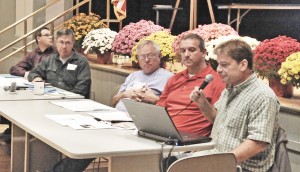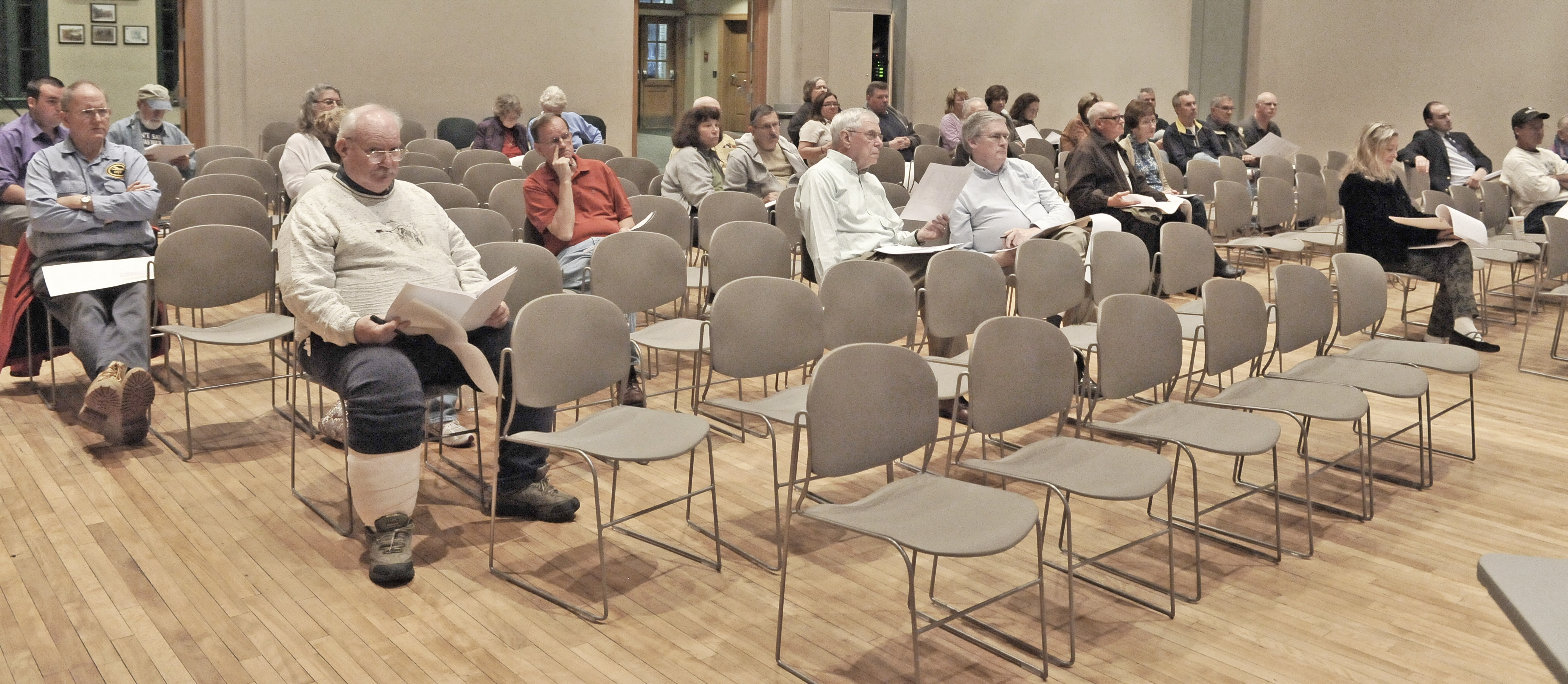
Dennis Clark, vice chairman of the Community Preservation Committee (CPC), right, presents a list of projects and purchased properties funded by the Community Preservation Act, during an informational meeting at the Southwick Town Hall Thursday night. Joining Clark are, John Whalley III, center, chairman of the CPC, and Christopher Pratt, second from right, a CPC representative. (Photo by Frederick Gore)
SOUTHWICK – The Community Preservation Committee (CPC) for the town of Southwick held an informational session Thursday night for residents to reacclimate themselves with the town’s participation in the Community Preservation Act (CPA).
First adopted by the town in 2002, the CPA was enacted under Governor Paul Cellucci in 2000 to set aside funds to assist towns with open space preservation; historic sites; affordable housing; and the acquisition and development of outdoor recreational facilities.
Over the past year, Southwick’s Board of Selectmen came to the conclusion that, 12 years after first adopting the CPA, a review might be in order, a sentiment shared by the town’s Finance Committee, which voted Monday night to bring it to a vote at the annual Town Meeting.
“We’ve held two work sessions and at the completion of our second session, we felt it was a good thing to hold this informational session,” said Selectboard Chair Russell Fox. “To give the voters of Southwick the opportunity to see what’s been accomplished over 12 years.”
John Whalley, chair of the CPC, spoke up prior to a presentation by CPC Vice Chair Dennis Clark.
“If you want to save a couple percent off the tax rate, cut it somewhere else because we’ve gotten a $7 million return on what we’ve paid into it,” said Whalley, directing his statement at Fox and Tracy Cesan, the two selectmen in attendance.
Clark used a PowerPoint presentation to illustrate to the almost 30 people in attendance the impact the CPA has had on the community, listing 23 completed or still in-progress projects the CPA has assisted in over 12 years.
The projects cost the town $1,982,516.30, provided through an additional tax of three percent, which the state matched up to $1,310,019.50.
Southwick received $4,901,250 in additional state monies for the 23 projects and received $628,465.91 in donations.
All told, the total costs for the 23 projects came to $8,821,458.91, a figure that members of the CPC believe speaks for itself.
“For less than $2 million, we have all of these projects which probably wouldn’t have gotten done,” said Whalley following the presentation. “The return on this money is just unbelievable.”
Following the presentation, the residents who spoke up were resoundingly in favor of keeping the CPA intact.
“I plan on living in Southwick for another 10 years and would then like to sell my house and would like the resale value to be pretty high,” said Harold Keep, a town retiree. “I believe any community that invests in itself and multiplies the money it invests in itself – ala state money – is going to be a community people want to live in. I happily would pay that CPC at three percent over the next 10 years.”
“We made no recommendation one way or another to rescind, reapprove, or change the tax percent. The thing we’re concerned about is what is coming up in the future,” said Terry Mish of the town’s Finance Committee. “There appears to be some additional tax increases coming up with the school and the possibility of this new stormwater unfunded mandate from the EPA (Environmental Protection Act).”
Mish reiterated that the committee didn’t make a recommendation to keep or cut the CPA, which didn’t sit well with Clark, who also took issue with the fact that there were no other members of the Finance Committee in the attendance due to there being another meeting scheduled at the same time.
“We’re looking at budgets all the time. This started in 2002, we’re going into 2015… things have changed,” said Fox, referencing the school building projects, the unfunded stormwater mandate and additional costs, including the need to purchase a new fire truck within the next five years at a cost of $1 million.
“These are all the things we’re looking at, in addition to annual increases in insurance, in electric, in heating,” he said. “We’re not trying to be the bad guys. All we’re trying to say is that we’re a community, we have to look at the whole picture. I think this is a tremendous program, but the board of selectmen wouldn’t be doing it’s job if we didn’t review this. If it’s a good project and the people believe in it, they’ll vote for it again.”
Conservation Commission member Marcus Phelps distributed a memo on the value of protecting open space.
“A lot of the CPA money has gone towards protecting open space through the purchase of development rights, so it is important to realize that, currently we have limited information on how much open space is in the town,” he said. “Our 2012 open space plan shows that 16 percent of the land is protecting open space. The remaining portion – 84 percent – is unprotected.”
Phelps added that open space costs the town 25 cents in services for every dollar collected in taxes, while residential properties cost $1.12.
“Of course, people have to have places to live,” he said. “But open space saves money.”
“We’re the westernmost Connecticut River Valley farmland. This is our ‘homeland security,'” said Jocelyn Linnekin, chair of Southwick’s Agricultural Commission. “You can grow anything in this dirt. When you let Southwick land go to McMansions, housing developments and strip malls… what we have here is homeland security – a bank of land that can be put toward productive use.”
“As a selectman, I look at it and say ‘yes, it’s an easy thing to cut,'” said Cesan, adding she’s supported Whalley Park and other CPA projects. “We’ve gotten wonderful things from it, those things don’t go away.”
Cesan declined to say whether she’s for or against keeping the CPA, but encouraged meeting attendees to come to other meetings to become more educated on taxation.
“I thought we had a great turnout with great feedback and positive comments,” said Clark after the meeting. “I was disappointed that the Finance Committee decided to take a vote before we’d had our meeting. I don’t think there is a reason for this to go to Town Meeting. I think it is a small minority who want it to.”


